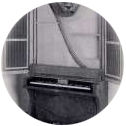
BIOGRAPHY
Josef Gabriel Rheinberger was born in 1839 in Vaduz, Liechtenstein, and began showing exceptional musicality at a young age. Already at the age of seven he played organ during church services in his hometown, at twelve he entered the Munich Conservatory where he soon outshone his classmates and composed numerous works. When he was only 19 years old the Conservatory offered him a professorship for piano and later also for organ and composition – a post he kept untilshortly before his death.
Rheinberger belongs to the composers of the second half of the 19th century who, after years of being forgotten, have increasingly been gaining awareness in both music performance and research. His extensive oeuvre – merely the published works with opus number reaching 197 – includes music for piano and organ, religious and secular choral music, solo Lieder, chamber music, symphonies, concert ouvertures, incidental music and operas.
Without trying to promote himself Rheinberger became a successful composer of his time, to whom publishers, musicians and choirs came with requests for compositions. Having been appointed court music director for King Ludwig II ofBavaria, Rheinberger played an important role in catholic church music in Germany from 1877 onwards. His latin masses and motets made him a pioneer, breaking away from the strict rules set at the time by the Cecilian Movement for church music reform. As professor of composition at the Munich Conservatory he was an authority with international standing. His students, amongst many others, included Engelbert Humperdinck, Ermanno
Wolf-Ferrari and Wilhelm Furtwängler, as well as a whole generation of young American composers (e.g. Horatio Parkerand George Chadwick).
Numerous accolades highlight Rheinberger’s success, including the Knight’s Cross from the Order of St. Gregory the Great, the Commander’s Cross from the Order of Merit of the Bavarian Crown, as well as an honorary doctorate from the University of Munich.
Rheinberger was a decisive classicist whose most important role models were Mozart and Bach. With his helpful and considerate nature and his open mind, and without a hint of ostentation, Rheinberger influenced a whole generation of musicians.
Thus he stands at the end of the classical-romantic era – a great teacher and significant representative of a multifaceted music culture.
STUDENTS
Rheinberger's Diaries at the Munich Conservatory
While teaching at the Royal Conservatory – later called "Akademie der Tonkunst" – Rheinberger meticulously kept lists of his students. These conservatory diaries, or "Musikschultagebücher", reveal to us who studied with Rheinberger between 1867 and 1901. However, they do not inform us about the many young and talented composers who sought Rheinberger's guidance privately. Amongst these was, for example, the composer Louise Adolpha Le
Beau, whom Clara Schumann sent to Rheinberger around1874. Also the renowned conductor Wilhelm Furtwängler was a private student of his.
Walter Kaufmann, one of the founders of the Josef-Rheinberger-Archive in Vaduz, collected and transcribed the Munich Conservatory Diaries:




































